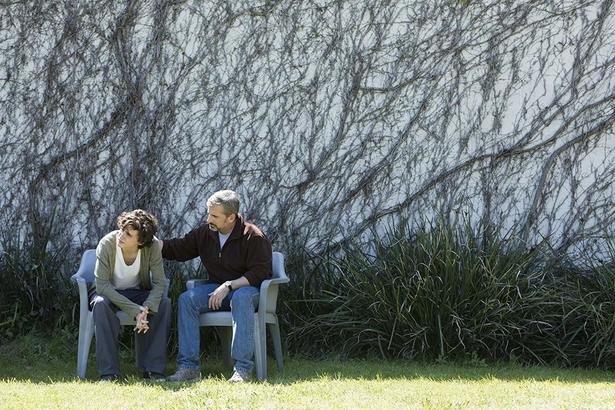BEAUTIFUL BOY
****
Director: Felix van Groeningen
Screenwriters: Luke Davies and Felix van Groeningen, based on the eponymous novel by David Sheff and Tweak: Growing Up on Methamphetamines by Nic Sheff.
Principal cast:
Steve Carell
Timothée Chalamet
Maura Tierney
Christian Convery
Oakley Bull
Kaitlyn Dever
Amy Ryan
Timothy Hutton
Country: USA
Classification: MA15+
Runtime: 120 mins.
Australian release date: 25 October 2018
Previewed at: Sony Pictures Theatrette, Sydney, on 15 October 2018.
The Belgian director Felix van Groeningen’s English-language debut, Beautiful Boy, is a harrowing portrayal of drug abuse adapted from freelance writer David Sheff’s book about his son Nic, Beautiful Boy: A Father’s Journey Through His Son’s Addiction, and Nic’s take on the events in his memoir Tweak: Growing Up on Methamphetamines. It shows how drug addiction can happen in any family, that it’s not just the preserve of people from dysfunctional backgrounds, although it’s often treated that way. It’s a compelling story that doesn’t pull any punches in its depiction of the depths of misery people find themselves in when they succumb to the lure of hard drugs. Van Groeningen is drawn to the type of drama that shows families under extreme pressure: his brilliant feature The Broken Circle Breakdown also portrayed a loving couple under stress when their daughter was diagnosed with cancer. He has said, “Family dynamics, the illusion of control, the passage of time - these are themes I was drawn to in my previous films.”
David (Steve Carell) is a middle-class journo who has re-married and lives in semi-rural bliss in the Bay area with his artist wife Karen (Maura Tierney). They have two children of their own, Jasper (Christian Convery) and Daisy (Oakley Bull), and David has a son from his first marriage, Nic (Timothée Chalamet, of Call Me By Your Name fame). David is a caring father who can be a bit over-bearing but flashback footage indicates that he always had a close, open relationship with Nic (young Nic is portrayed by two different child actors at the ages of four, six and 12) and becomes frustrated at his son’s increasing detachment as he grows older. We learn that Nic was experimenting with recreational drugs at a young age but he developed a serious habit when he was introduced to crystal meth and “the world went from black and white to Technicolor.” David seeks professional advice and makes every effort to set Nic back on the straight and narrow by getting him into rehab, as does his former wife Vicki (Amy Ryan), but over time they learn that nothing is simple when dealing with addiction. There are no easy solutions. Van Groeningen takes the audience into the depths of despair alongside David as he watches Nic repeatedly enter rehab but, even with his love and support, the wretched young man relapses, unable to rid himself of his habit.
Beautiful Boy is essential viewing that doesn’t camouflage the heart-breaking consequences of drug addiction and shows that, even if a victim has support and understanding, it’s never enough once the hook is in. Australian writer Luke Davies, who had his own 10-year battle with addiction and wrote the Heath Ledger-starring Candy as a result, co-wrote the screenplay with van Groeningen. Their script combines the POV of both father and son by focussing at times on each one individually, while the other disappears, thus enabling the writers to show how the behaviour of one would affect the other. It’s as close as you would want to get to experiencing such a tragedy. Chalamet manifests Nic’s futile desperation in a performance that is nothing less than heartbreaking - Oscar material, in fact; and he’s equalled by Carell, whose exposition of paternal anxiety is just as overwhelming and convincing.
The final word should go the director, who said, “As we finished the film and I returned to Belgium, I became a first-time father to my son. It is incredible to feel the joy of loving someone that much. I hope this film helps people to feel and understand different points of view and might open the hearts and minds of the people who see it, as the Sheff’s story did for me.”
